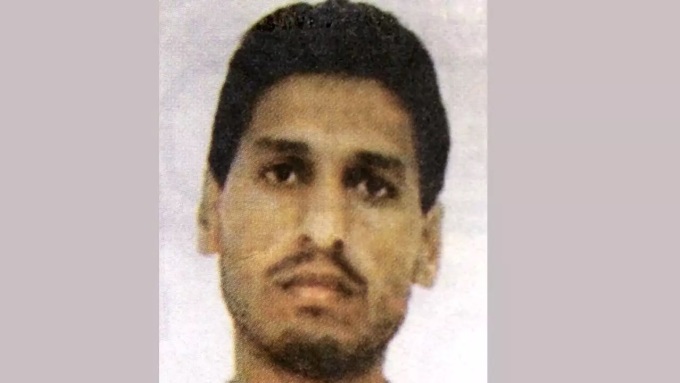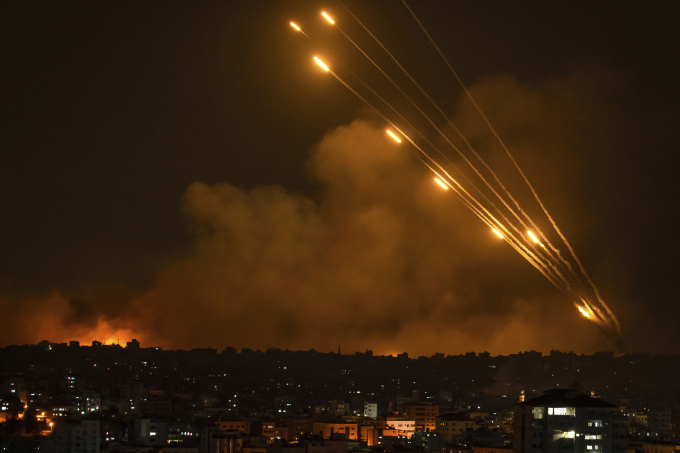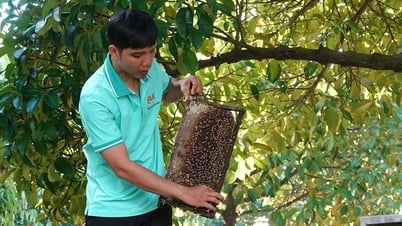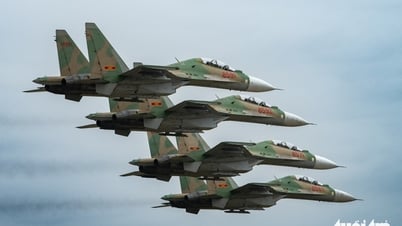Mohammed Deif has been wanted by Israeli intelligence for three decades, but still commands Hamas to carry out an unprecedented raid campaign.
Israeli fighter jets on the night of October 10 airstrikes hit a house where many relatives of Mohammad Deif, commander of Hamas' military wing, live in Qizan an Najjar street, Khan Younis city, southern Gaza Strip, killing at least three people.
Deif has become Israel's number one "search and destroy" target, as the leader of Hamas's Izz al-Din al-Qassam brigade has been identified as the mastermind behind the unprecedented attack on Israel on October 7. The raid sparked bloody clashes between Israel and Hamas, killing more than 2,150 people.
Having survived several assassination attempts, Deif is “the last survivor of the Palestinian resistance,” according to Omri Brinner, an analyst on the Middle East and Israel at the Verona International Security Studies Group (ITSS). His ability to elude Israeli intelligence agencies has earned him the nickname “the man with nine lives.”

Mohammed Deif in the only photo taken in the 2000s. Photo: AFP
Listed as an international terrorist by the US since 2015, Deif has been a direct and continuous threat to Israel's security for the past 30 years, becoming a highly sought-after target of the national intelligence agency Mossad, a unit famous for assassinating targets abroad.
"People who use violence against Israel tend to have low life expectancies, so it's remarkable that he has survived so long," said Jacob Eriksson, an expert on the Israel-Palestine conflict at the University of York in Britain. "He is a long-standing stain on Israel's reputation for taking out targets it sees as threats."
The secret to Deif’s survival under Israel’s surveillance network lies in his ability to remain hidden. Israeli intelligence has only one photograph of Deif, taken more than 20 years ago, because the Hamas military leader has left no trace of his activities.
Deif's real name is unknown, although some sources say it is Mohammed al-Masri. Deif is Arabic for "guest," a reference to the fact that he did not stay in any place for more than one night to avoid detection by Israeli forces, according to Eriksson.
On July 12, 2006, Mossad learned of a meeting of senior Hamas leaders. Israeli F-16 fighters immediately launched a "surgical strike", dropping precision-guided bombs on the house where the meeting was taking place, but Deif survived, although he is said to have lost his eyesight, an arm and a leg.
In August 2014, an Israeli air strike on a house near the Sheikh Radwan neighborhood of Gaza City killed Deif’s wife, Widad Asfoura, 27, and their two children. Hamas said Deif survived the attack.
In April 2015, Israeli media cited intelligence sources as saying that the Hamas military commander had survived another Mossad assassination attempt. In 2021, Israeli intelligence reportedly tried to assassinate Deif twice in one week, but he narrowly escaped each time.
Little else is known about Deif’s life. He was born in the Khan Yunis refugee camp in southern Gaza in the 1960s, an Israeli intelligence official told the Financial Times .
In 2014, the Washington Post reported that Deif had studied at the Islamic University in Gaza, where he regularly met members of Egypt's Muslim Brotherhood, of which Hamas later became an offshoot.
Deif joined Hamas in the late 1980s with the help of Yahya Ayyash. Known as “The Engineer,” Ayyash was one of Hamas’s main explosives experts with whom Deif was very close, according to Eriksson.
After planning suicide attacks in the 1990s, Deif became increasingly important to Hamas, especially after Ayyash was assassinated by Israeli intelligence in 1996. He was appointed leader of the Izz el-Deen al-Qassam brigade in 2002.
One of Deif’s first acts as leader was to apply the lessons of the second Palestinian intifada in the early 2000s. Deif ordered the construction of a complex underground tunnel system to allow Hamas fighters from the Gaza Strip to infiltrate into Israel. He also advocated the maximum possible use of rockets against Israel.
Deif's modus operandi has always been to "directly attack Israeli territory in any way possible to inflict the heaviest damage on the country for what it has done to the people in Gaza," according to Eriksson.
"To counter Israel's fortified border fence, Deif has developed an 'underground and overhead strategy', which means digging tunnels and firing rockets," Brinner said.
The military commander said Hamas needed to carry out operations to make any purely political solution to the Israeli-Palestinian conflict impossible.
“His philosophy was to use military solutions to conflicts,” Brinner said, adding that it was no coincidence that Deif launched a major suicide bombing campaign in the mid-1990s, shortly after the Palestine Liberation Organization and Israel signed the Oslo peace accords.
This preference for purely military means partly explains why Deif has “unparalleled popularity among the people of Gaza,” according to Brinner. In 2014, a poll conducted by a Palestinian news site found that Deif was more popular than Hamas leader Khaled Meshal and Ismail Haniyeh, the group’s top political leader in Gaza, although both are very popular with Palestinians.
"He is a military leader, so he does not face criticism for how Hamas handles the humanitarian and social aspects in Gaza," Eriksson said.
“He is also the only person who lives in Gaza and raises his children there,” Brinner added. This is significant for Gazans, who accuse Haniyeh of leading Hamas from a “luxury hotel in Qatar.”

Rockets launched from the Gaza Strip into Israeli territory on the night of August 8, 2023. Photo: AP
Deif's reputation in Gaza is likely to increase after organizing an attack that completely surprised Israeli intelligence and military forces.
"Hamas has been planning the operation for the past two years without any information leaking out. That shows the loyalty of the select few involved in planning the operation," Brinner said.
This loyalty has allowed Hamas to remain secretive to the very end, even with Israel’s high-tech surveillance network across the Gaza Strip. The Israeli military has been caught completely off guard and unable to defend its borders, despite decades of being a proud technological powerhouse with an impressive armed force and the world’s leading intelligence agency.
Thanh Tam (According to France24 )
Source link






































































































Comment (0)